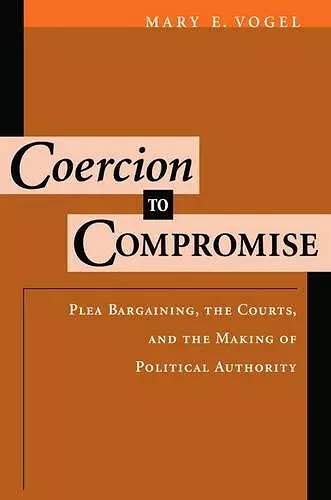Coercion to Compromise
Plea Bargaining, the Courts, and the Making of Political Authority
Format:Paperback
Publisher:Oxford University Press Inc
Published:29th Nov '07
Currently unavailable, and unfortunately no date known when it will be back
This paperback is available in another edition too:
- Hardback£49.49(9780195101744)

This book examines the origins of the controversial practice of plea bargaining, a procedure that appears to reward the guilty. Contrary to popular perception of plea bargainingas as an innovation or corruption of the post-World War II years, this study shows the practice to have emerged early in the American Republic. Vogel argues that plea bargaining arose in the 1830's as part of a process of political stabilization and an effort to legitimate the democratic institutions of self-rule that were crucial to Whig efforts to reconsolidate the political power of Boston's social and economic elite. At this time local political institutions were spare and fragmentary, and the courts, she argues, stepped forward as agents of the state to promote social order. Plea bargaining drew conflicts into the courts while maintaining elite discretion over sentencing policy. She argues that plea bargaining should be seen as part of a larger repertoire of techniques in the Anglo-American legal tradition through which law might be used as a vehicle of rule. In this context, plea bargaining provided a unique match between the needs of elites to maximize flexibility in criminal sanction and an emerging liberal ideology.
"A magnificent achievement. Coercion to Compromise is a comprehensive, yet subtle and theoretically rich history of the origins of plea bargaining in the nineteenth-century Massachusetts courts. An important book, [it] will reward its readers tenfold."--Susan Silbey, author of The Common Place of Law "Plea bargaining has long been a controversial practice, symbolizing either unwarranted leniency for offenders and the deliberate subversion of formal legal authority, or an emphasis on efficiency at the expense of justice. Mary Vogel explores its distinctively American origins in the context of social and political change in early nineteenth-century America in a book which raises the analysis of the criminal process to a new level of theoretical sophistication."--Dr. Keith Hawkins, author of Law as Last Resort "Coercion to Compromise is a powerful, important book. [Vogel] not only enlarges our understanding of the foundations of American criminal justice, but also illuminates the source of critical failures underlying plea bargaining in our own time. This is a pathbreaking work using the methods of social science and history to provide an authoritative and original analysis of previously uncharted terrain."--Frank Munger, author of Rights of Inclusion "This ambitious and compelling study provides a novel explanation for the emergence of plea bargaining in the American judiciary system. Vogel has written a social history of the first order and in the process sheds light on the limitations of plea bargaining in the contemporary context."--Kitty Calavita, coauthor of Big Money Crime "A magnificent achievement. Coercion to Compromise is a comprehensive, yet subtle and theoretically rich history of the origins of plea bargaining in the nineteenth-century Massachusetts courts. An important book, [it] will reward its readers tenfold."--Susan Silbey, author of The Common Place of Law "Plea bargaining has long been a controversial practice, symbolizing either unwarranted leniency for offenders and the deliberate subversion of formal legal authority, or an emphasis on efficiency at the expense of justice. Mary Vogel explores its distinctively American origins in the context of social and political change in early nineteenth-century America in a book which raises the analysis of the criminal process to a new level of theoretical sophistication."--Dr. Keith Hawkins, author of Law as Last Resort "Coercion to Compromise is a powerful, important book. [Vogel] not only enlarges our understanding of the foundations of American criminal justice, but also illuminates the source of critical failures underlying plea bargaining in our own time. This is a pathbreaking work using the methods of social science and history to provide an authoritative and original analysis of previously uncharted terrain."--Frank Munger, author of Rights of Inclusion "This ambitious and compelling study provides a novel explanation for the emergence of plea bargaining in the American judiciary system. Vogel has written a social history of the first order and in the process sheds light on the limitations of plea bargaining in the contemporary context."--Kitty Calavita, coauthor of Big Money Crime
- Winner of Runner-up for the 2008 British Society of Criminology Book Prize.
ISBN: 9780195101751
Dimensions: 155mm x 229mm x 31mm
Weight: 641g
448 pages